Sensory language spices up your writing and allows readers to experience your words as if they’re living your story. You can use sensory words in any type of writing, including business writing.
This article includes:
The science behind sensory details
6 types of sensory language
Example sentences with sensory details
A list with 75 sensory phrases
6 books that showcase sensory writing
![]()
How to use sensory details
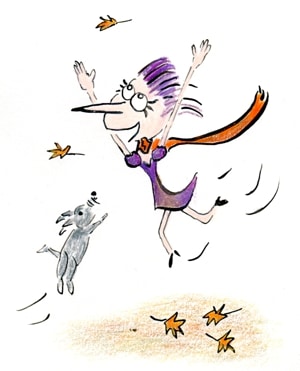 Aarggh …
Aarggh …
A thumping headache.
Does it ever happen to you?
You should work, but you can’t. You don’t want to deal with your to-do list, an overflowing inbox, an incessant stream of tweets.
You find your walking boots and get out.
The smell of rain lingers in the air. A gentle breeze soothes your aching head. You watch the sun rays play with the golden leaves.
Can you picture the scene?
That’s because of the sensory details
You might think that sensory words are for poets and novelists. For creative spirits. Not for serious business people like you and me.
But that’s not true.
Using sensory language can help you captivate your audience—a business audience, too. Sensory language helps readers experience your words, almost as if they’re present, right in the middle of your story. What’s more, sensory details add personality and flavor to boring content, helping you stand out in a sea of grey voices that all sound the same.
Shall I explain?
The science behind sensory words
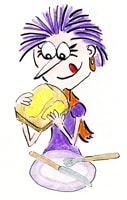 Sensory words are more powerful and memorable than ordinary words because they make your reader see, hear, smell, taste, or feel your words.
Sensory words are more powerful and memorable than ordinary words because they make your reader see, hear, smell, taste, or feel your words.
When reading non-sensory words, your brain processes text. But when you read sensory words different areas of your brain light up. Your brain processes sensory words as if you taste a sweet cake, as if you see a dazzling display of colors, as if you feel a rough texture.
And we also know from research that when we can hold a product the desire for the product increases. Might we be able to increase desire simply by using sensory words so people can imagine holding our products?
Sensory words can even boost sales. Research into menus suggests that describing dishes using sensory words makes more people buy them.
So, sensory words are truly magic.
Click here to get the 22-page ebook How to Choose Words With Power and Pizzazz (it’s free!)
What are sensory words?
Sensory words are descriptive—they describe how we experience the world: how we smell, see, hear, feel or taste something.
- Words related to sight indicate colors, shape, or appearance. For instance: gloomy, dazzling, bright, foggy, gigantic.
- Words related to touch describe textures. You can use them to describe feelings and abstract concepts, too: gritty, creepy, slimy, fluff, sticky.
- Words related to hearing describe sounds. For instance: crashing, thumping, piercing, tingling, squeaky. Often these words mimic sounds—that’s when they’re called onomatopoeic.
- Taste and smell are closely related. Most taste and smell words are easy substitutes for bland words like good, nice, or bad. For instance: zesty, tantalizing, sweet, stinky, stale.
- Motion is sensory, too. By using active words or describing movement, you help your readers experience your words. For instance: vibrating, soaring, mind-boggling, staggering, bumpy.
You can create a multi-sensory experience in your writing. Here’s an example from Benjamin Myers’ book The Offing:
Sitting here now by the open window, a glissando of birdsong on the very lightest of breezes that carries with it the scent of a final incoming summer, I cling to poetry as I cling to life.
Within one sentence Myers shares a visual detail (the open window), an auditory detail (a glissando of birdsong), a sense of motion and touch (the lightest breeze), and a sense of smell (the scent of the incoming summer).
But sensory words are not just for novels …
Example sentences: How to appeal to the senses in business writing
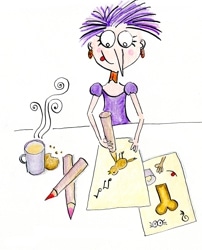 In business writing, we don’t need to write sentences as poetic as Myers’ sentence above.
In business writing, we don’t need to write sentences as poetic as Myers’ sentence above.
We can add a touch of poetry by using one or two sensory words—to make our writing more vivid and to shape a stronger writing voice.
You can find opportunities to use sensory words almost everywhere—in headlines and email subject lines, on your About page, in product descriptions, business emails, or e-newsletters.
For instance:
A headline without sensory words:
5 Tips for Turning Boring Information Into a Practical Tutorial
With sensory words:
5 Tips for Turning Drab Information Into a Tantalizing Tutorial
A business email without sensory words:
Unfortunately, I’m currently too busy to take on new projects.
With sensory words:
Unfortunately, my schedule is jam-packed; and I’m unable to squeeze in new projects.
A product description without sensory words:
These long-lasting cabinets are made from the best material, guaranteed for 10 years.
With sensory words:
These cabinets remain squeak-and-creak free. That’s guaranteed for 10 years.
A bio without sensory words:
Irreverent copywriter on a mission to eradicate gobbledygook and to make boring business blogs interesting.
With sensory words:
Irreverent copywriter on a mission to stamp out gobbledygook and to add sparkle to business blogs.
A sentence without sensory words from a blog opening:
Imagine your writing is slowing readers down.
With sensory words:
Imagine your readers trudging. Their shoes feel heavy. Squelch. Sploosh. Squelch. Sploosh.
Sensory details inject a dose of personality into your writing. They make your writing stand out, and help readers picture the scenes you’re describing.
Sensory words for emotions
Emotions can often be expressed with sensory words.
For instance, you can use the word prickly (tactile) to describe feeling irritated. And when you’re calm, you’re cool-headed (also tactile). When you’re energetic, you’re buzzing (auditory) or bouncing (motion). You can feel bitter (taste). You can be bright or gloomy (visual).
To find a sensory word for an emotion, think about the sensation that that emotion causes in your body. When you’re nervous you become jittery or jumpy. When you’re angry, your body temperature rises, so you feel fiery or hot-headed.
Amplify your words with sound symbolism
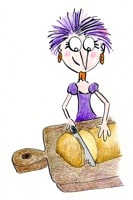 There’s a little-known category of words that can make your writing even more expressive.
There’s a little-known category of words that can make your writing even more expressive.
You may have heard of onomatopoeic words?
Onomatopoeic words express a sound such as to squeal, whoosh, or boom!
But there’s a different, more subtle category of words. Words with sound symbolism are associated with a specific sensory experience. For his master’s thesis, James Harbreck studied such words and found that their usage has been increasing over the last two centuries.
Harbreck mentions examples like:
- Words starting with gl– are associated with light, such as glint or glimmer
- Words ending with –irl or –url often relate to circular or spiral motion or shape such as curl, swirl, whirl, or twirl
- Words ending with –ump tend to be associated with roundness or heaviness, such as lump, clump, hump, or rump
According to Harbreck, words with sound symbolism (more here) are used more regularly in fiction than non-fiction.
But we can change that.
We can use such words to make our writing glitter and glow more brightly.
The truth about captivating your audience
You can use the same words every business writer uses.
It’s a quick way to write a lot of text. But you sound the same as everyone else, and the noisy internet machine drowns out your words. Your message gets lost.
So, try to release your inner poet and pick your words with care and precision.
Make your readers crave your next article.
Get them to fall in love with your writing, and get them to fall in love with your voice.
Click here to get the 22-page ebook How to Choose Words With Power and Pizzazz (it’s free!)
![]()
A list of 75 sensory phrases
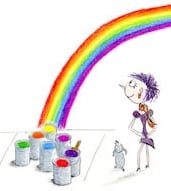 Sensory language #1: Visual words
Sensory language #1: Visual words
Sensory words for sight allow you to paint vibrant (or gloomy) pictures.
What are you seeing? What’s the size? What’s the light like? What are the colors?
Examples of visual words:
Gigantic
Teeny-tiny
Bulky
Glitter
Sparkling
Shimmering
Shiny
Glowing
Crooked
Hazy
Shadowy
Gloomy
Drab
Murky
Dull
Knotty
Vibrant
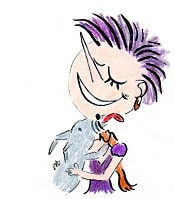 Sensory language #2: Tactile words
Sensory language #2: Tactile words
Sensory words for touch allow readers to sense the silky-smoothness of your words.
How does something feel when you touch it? What’s the texture? The temperature? How does the humidity or pressure of the air feel?
Examples of tactile words:
Fluffy
Gritty
Rough
Smooth
Slimy
Sticky
Creepy
Crisp
Hairy
Chilled
To stifle
Woolly
Crisp
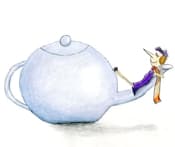 Sensory language #3: Auditory words
Sensory language #3: Auditory words
Sensory words for hearing allow readers to hear what’s happening.
How does someone’s voice sound? What kind of sounds are made? Is it loud or soft?
Examples of auditory words:
Buzz
Hubbub
Humming
Faint
Deafening
Squeaky
Earsplitting
Serene
To sizzle
To hiss
To shriek
Snappy
Boom!
Roaring
Thundering
Crunchy
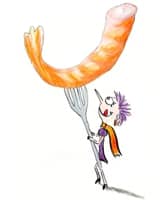 Sensory language #4: Words related to taste and smell
Sensory language #4: Words related to taste and smell
Sensory words for taste and smell help you turn a bland text into lip-smackingly tasty writing.
What kind of aroma is there? Is it natural or artificial? Strong or subtle? Pleasant or repulsive? And does something taste sweet, sour, savory, salty, or bitter?
Examples of words related to taste and smell:
Bland
Rotten
Fragrant
Stale
Juicy
Stinky
Gooey
Bitter
Yummy
Lip-smackingly
Pungent
Zesty
Sweet
Spice
How to describe a smell in writing: 3 nose-tickling examples
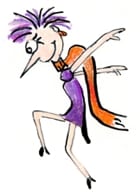 Sensory language #5: Motion words
Sensory language #5: Motion words
When you use strong verbs to describe motion, readers experience the motion as if they’re there, too.
Is the car swerving? Is the flight turbulent? Is the sea choppy?
Examples of motion words:
Soaring
To resonate
To breeze through
Staggering
Blown away
Paralyzed
Eye-popping
Gobsmacked
Shocking
To grab
Jaw-droppingly good
Turbulent
Choppy
Swirling
To wriggle
![]()
Click here to get the 22-page ebook How to Choose Words With Power and Pizzazz (it’s free!)
6 books that showcase sensory writing
The books listed below showcase sensory writing.
When you see how others use sensory details in their writing, it becomes easier to appeal to the senses in your own writing, too.
To accelerate the learning process, pay attention to imagery in the text. How do the authors help you imagine the scenes they describe? Which smells, feelings, tastes, sounds, motions, and sights do they refer to? Which words do they use to describe those sensory experiences? Which words do you like best? Add your favorite sensory words to a list and see whether you can include them in your own writing.
You can learn from any type of writing. If you’re writing about business, you can learn from fiction or science writing, too.
The links below are affiliate links. If possible, please support your local bookstore.
1. A sensory novel
Elif Shafak excels at sketching multi-sensory images to transport her readers to a different world. Here’s an example:
The brothel where Leila worked was among the oldest in the area. A single fluorescent tube flickered at the entrance with the force of a thousand tiny matches catching light and burning one after another. The air was thickened by the scent of cheap perfume, the taps encrusted with deposits of limescale and the ceiling coated with the sticky brown stains of nicotine and tar from years of tobacco smoke.
From: 10 Minutes 38 Seconds in this Strange World by Elif Shafak
2. A sensory business book
Chip and Dan Heath are my favorite business writers. In their book The Power of Moments, they show how to weave miniature stories into your writing—even a business book.
The Power of Moments explains why certain customer service experiences have extraordinary impact. Here’s an example of their writing:
Let’s start with the cherry-red phone mounted to a wall near the pool. You pick it up and someone answers, “Hello, Popsicle Hotline.” You place an order, and minutes later, a staffer wearing white gloves deliver your cherry, orange, or grape Popsicles to you at poolside. On a silver tray. For free.
From: The Power of Moments by Chip Heath and Dan Heath
3. A science book that appeals to the senses
In his book The Eloquence of the Sardine, Bill François uses vivid imagery to show us what it’s like to be a fish. Here’s a snippet:
Some fish emit sounds through their swim bladders, pouches of gas located in their abdomens that keep them neutrally buoyant. They use these swim bladders as a drum, like children who tap out rhythms on their bellies after eating, an unaccountable music we’ve all made at one time or another. Patting their bellies like this, with the help of special stomach muscles, drum fish croak, groupers grunt and gurnards rumble. Their sounds are reminiscent of foghorns, drum solos or TV game-show buzzers.
From: The Eloquence of the Sardine: The Secret Life of Fish & Other Underwater Mysteries by Bill François, translated by Antony Shugaar
4. A nature book full of sensory language
Braiding Sweetgrass by botanist Robin Wall Kimmerer mixes Native American wisdom with western science, plus lots of sensory descriptions of nature. Here’s a sample:
You could smell ripe strawberries before you saw them, the fragrance mingling with the smell of sun on damp ground. It was the smell of June, the last day of school, when we were set free, and the Strawberry Moon, ode’mini-giizis. I’d lie on my stomach in my favorite patches, watching the berries grow sweeter and bigger under the leaves. Each tiny wild berry was scarcely bigger than a raindrop, dimpled with seeds under the cap of leaves. From that vantage point I could pick only the reddest of the red, leaving the pink ones for tomorrow.
From: Braiding Sweetgrass by Robin Wall Kimmerer.
5. A food memoir
As Nina Mingya Powles shows in her book Tiny Moons: A Year of Eating in Shanghai, food writing isn’t just about describing taste and smell.
Here’s a tiny taster:
I eat my guotie right there, standing beneath the fluorescent lights. First the crunch, then hot soup scalds my tongue – I wasn’t expecting so much soup – then gingery, garlicky pork in the middle.
From: Tiny Moons: A Year of Eating in Shanghai by Nina Mingya Powles
6. A guidebook to smell
In her book Revelations in Air, Jude Stewart describes a variety of aromas, the stories behind them and the memories that smells can evoke.
For instance, here’s how Stewart describes the smell of oranges:
They smell sparkling, clean, literally zesty. Oranges invigorate the nose with a bright acidic tang, over which plays a light, balanced sweetness. It’s affable and domestic, a lunchtime smell.
From: Revelations in Air by Jude Stewart
![]()
FREE 22-page ebook
How to Choose Words With Power and Pizzazz
How to Choose Words With Power and Pizzazz
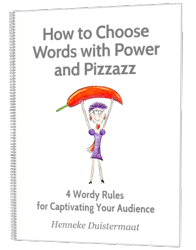
- Discover 4 wordy rules for captivating your audience
- Learn how to fortify and energize your message
- Get examples that show you how to spice up your writing
Further reading on sensory details in writing:
Imagery examples: How to paint pictures with words
How vivid language makes your message unforgettable [Case Study]
9 “show don’t tell” examples from inspirational storytelling


Your content is Jaw-droppingly goodness Henneke 😂
I love your writing because of your style concise and vivid, and because you always show examples.
Tks a lot! I’ve already get my free guide 🙌🏾
Thank you so much, Paulo. I put a lot of effort in selecting (or creating) useful examples because I think it’s an essential part of teaching. It’s nice when it’s noticed!
Thoroughly enjoyed reading about sensory words. I was searching for words to describe feelings about clothes I wear.
Any tips on this.
The advice is the same as for describing emotions: “To find a sensory word for an emotion, think about the sensation that that emotion causes in your body. When you’re nervous you become jittery or jumpy. When you’re angry, your body temperature rises, so you feel fiery or hot-headed.” So, how do you feel when you wear particular clothing and how does that feeling manifest in your body or how does it show in your movements?
Thanks for this crispy, sparkly, sizzling, yummy, soaring exposition. I love it.
Do you know of any source with even more, long lists of, sensory words to describe feelings? E.g., ‘I am not sad — my experience is heavy, drab, squelched, murky [etc.]’.
I’m not sure whether there are longer lists. I know there are at least two dedicated dictionaries about emotions but I’ve not checked either of them out, so I can’t really recommend one but you may want to check them out.
Hi Henneke,
I am bookmarking this page to use sensory words the next time I create a post on social media or blog. I was missing an impact without them. Indeed, try them in the coming days.
I hope you’ll have fun choosing sensory words and weaving them into your content!
Hola. Muchas gracias por el contenido. Realmente MUY valioso. Se deja saborear dulcemente letra por letra, entrando por los ojos y llegando a iluminar mis ideas como faro entre la niebla.
(primera practica sensorial jajjaj)
Thank you, Carlos. It sounds like you’ll have a lot of fun using sensory words. Happy writing!
Love this article. I needed more sensory words for my poetry.
Thank you, Jackie. Happy writing!
I am going to infuse this method of writing when I edit what I have written thus far. thanks again.
Great. Happy writing!
I am very glad to have come across this page after asking a question on how to use the five senses in my writing. I’ve found it very very useful. Kindly recommend a book on this for me if possible.
There are several book recommendations included in this article: https://www.enchantingmarketing.com/sensory-words/#books. I don’t know any other recommendations.
I’m excited to join the sensory writing conversation!
Great to have you join our conversation, Connie 🙂
After reading your excellent article, I took up again a chapter I was close to finishing.
Much better. Thank you.
Great! I’m glad my tips were useful. Happy editing, Kevin. Thank you for stopping by.
Hi, I’m learning more about sensory words day by day as I want to be a songwriter.
Correct me if I’m wrong here:
Sight words are Adjectives
Smell words are Adjectives
Sound words are Verbs
Taste words are Adjectives
Touch words are Adjectives
Motion words are Adjectives/Verbs
Most of these can be adjectives, adverbs, verbs, or even nouns. For instance, he heard a loud bang—loud is an adjective, bang is a noun, and both are sound words. She tickled him—tickle is a touch word, and it’s a verb.
As a student this is very helpful for me for my assignment and examination
I’m glad you found it useful. Good luck with your exam!
If I continue feeding on your content, I’ll surely Master the skills to hot-wire sentence after sentence in my writings. Nice job, Henneke. Thank you for the helpful post👊
Happy hot-wiring! 🙂
I have a question. Is perfect a sensory word?
No, it’s not sensory. It doesn’t tell us how something looks, smells, sounds, feels, or tastes.
Wow, this is awesome Henneke. I am on Day 3 as l follow your 5 step process of writing. Truthful your writing is to die for, l really envy you in a good way and thank you for all the work you put in.
What a lovely comment. Thank you, Emily!
Hola Henneke, gracias por este excelente artículo. Soy de Perú. Leo todos tus correos y los enlaces que están dentro, son súper Interesantes. Tengo una consulta. ¿Puedo también escribir estás Palabras sensoriales en una carta de ventas de cualquier producto?.
Gracias!
Yes, you can also use sensory words in product descriptions as long as you don’t make the descriptions difficult to read.
bonjour Madame,
Je tenais a vous remerciez pour vos conseil qui me sont plus que precieux. Je suis entrepreneur dans le commerce electronique et je travail seul et cela implique les fiches descriptives de mes produits . N’ayant jamais ete tres fort en redaction je penais jusqu’a se que je tombe sur votre site .Depuis que je suis vos conseil j ai nettement mloin de mal a trouber mes mot et surtout a creer des emotion . mille merci
Merci, Monsieur. Happy writing!
Dear Trainer,
I am, by profession, a teacher. Although I myself teach writing skills to my students, the way you explained sensory details, it is undoubtedly very much helpful. I would love to share your ideas with my students, and I will also give reference to your article and website.
Please feel free to share this with your students. Happy teaching!
This was great for my third grader. Thank you for sharing!
Thank you, Eve. I’m glad this was helpful 🙂
Good evening ma’am, I got to learn so much about sensory writing after reading your article. And I personally feel that my ability to write will also improve after the implementation of these techniques. But I have one small doubt, Can you please throw some light on “when not to use Sensory writing?”.
Thank you and have a nice day
It depends on the tone of voice you want to use. If you’re, for instance, writing a formal letter on behalf of a bank, you probably won’t make the writing too sensory.
Luckily, I checked my E-mails and I found this informative one. I got a problem of the tone of my voice, and the way I’m telling a story. So the only thing I lost in my writing techniques are: emotions, sensory words (this blog), and imagining a vivid imagery and painting it as a word (another topic in your blog). I thankfully found this article and it is very simply explained but can be as intelligent as well. Love from Philippines
I’m glad this was useful. Happy writing, Jhared.
I am glad that I found your site to learn so many essential tips. Every word from your article is always humming in my mind when I face any trouble with my writing. However, I am still struggling and trying to build a specific tone.
Don’t worry to much about your tone. Keep writing (and reading) and it’ll come.
Thank you for stopping by and for your compliment, Dylan. Happy writing!
Wow, I’m probably the only guy who becomes obsessed over your writing visiting for the first time.
I have completed 3 posts of you right now and I don’t know how I would describe you as a writer.
Your writing is so clear and concise Henneke.
And one thing for sure that everyone has to admit is that you are truly genius to captivate our attention with your words.
At the end, I have one question that I like to get answer from you Henneke – As I’m new to this world of writing, can I start using these sensory word, using story telling with my Sass freelance writing career?
Thanks so much for your compliment, Anjan.
Yes, you can start using sensory words right away. When writing for clients, it’s useful to pay attention to their brand voice. See also: https://www.enchantingmarketing.com/word-choice/
Hi – I really enjoyed this article and it was full of great information about the power of sensory words. Very helpful. Thanks!
Thank you, Dee. Happy writing!
My heartfelt thanks to you as I could learn amazing sensory words.I am definitely going to use all these words in my daily lessons.These vibrant words really sparkle my mind
Happy sensory writing!
Oh wow! This post is so yummy, I am craving for more. Thanks so much again for writing jaw-droppingly good articles Henneke. YOU just made my day so zesty!
All the best.
Josh | Soulful Encourager
P.S.
Thank you for the sensory words samples. They are now swirling around this comment. Am just making much of this blown-away moment with you our epic mentor. ??❤ Sincerely, Muchas gracias!
I’m so glad you gobbled up this post, Josh 🙂
Happy sensory writing!
I just love your tips on how to make better copy. I teach ESL in Thailand and try to introduce some sensory words into my lessons and writing; they add so much color and style.
I’m glad you enjoyed this article about sensory words. Happy teaching!
Nice materials for teachers of literature like me. I enjoyed the sensory words.
Thank you, Vedaste. It seems more and more teachers are reading my blog posts and joining my email list.
If we have Bloom’s Taxonomy in education, perhaps this has got to be Henneke’s Classification of Content Words for Marketing…
Thank you for this great article. Much help for someone like me.
RGSuyom from the Philippines
Thank you, Reginaldo. Happy writing!
We caressed dolphins this week and can’t find a word to best describe that sensation on your hand as they pushed against you. How can this be quantified in such a way to justify the unique experience with a single word?
I don’t know what that sensation is like, so I don’t know what word to use. But it’s okay to use more words to describe your sensation. Perhaps you can compare it to something else?
Hi Toby, I have touched dolphins too and can describe their presence and feel as: warm soft peaceful energy; or their skin feels warm, slimy and soft and their presence oozes with love and peace. Narrowing down words that describes them are: Love and Peace. Thats how I felt when they swam around my legs, I was in awe of their loving peaceful energy. May be one word to use would be that they represent either serenity or quiescent
Love this so much!
Thank you, Robert 🙂
This is a particularly important concept to me. I have a new hand-dyed yarn company opening soon called Peaceful Yarns. It’s called that not only because I live in the Peace Region of Canada but because knitting/crocheting is peaceful, beautiful yarns and colours can make one feel peaceful. Plus yarns are stories and I want to tell peaceful stories on my webpage. I totally get this use of emotional words but it will be a challenge to use them in practice. I’m more used to writing technical manuals.
But I’m up for the challenge and I’m learning a lot from these emails. Thanks Henneke
I love your point about knitting and crocheting being peaceful. While I’m not a knitter myself, I’ve always considered it a meditative activity (similar to coloring drawings). You may find that reading articles (or even poems) about meditation or other peaceful activities gives you ideas about words you could use.
I like your idea of yarns are stories, too.
Hi!
It’s quite Vivid, Vibrant, Vivacious sensory perception that makes my eyes wide open, my ears ricking, my nose sharp and swelling, my tongue touching my palate and finally makes me sit, walk, run, jump in joy, cavorting and gamboling.
I am looking forward to hearing more from you.
Thanks,
I’m glad you’re jumping in joy 🙂
Happy writing!
Thanks for your article! I recently joined your newsletter. Your letters are very interesting and useful. And they are not boring!
Thank you so much, Alina. I’m glad you’re enjoying my writing 🙂 Happy writing to you!
Henneke,
You have brought sensuousness back into business. What a relief.
Yes, it doesn’t all have to be dull 🙂
Thanks for the replies Ma’am Henneke!
But I replied you again. I also updated the content where I included you and the Enchantingmarketing.
I hope to see your reply ma.
Hello, Henneke. I am Jhared from Philippines, I really love how you stalk me (Well, in a good way). What I mean is you are giving me an Advice like this with email eventually. I like it and you helped me a lot. That is a great idea! Great job.
I’m glad you’re finding my emails and blog posts useful, Jhared. Thank you for stopping by!
Huula! Henneke! This is really awesome. It’s high time I leveraged sensory words.
I’ve been following you all this while. And you’ve always been a saviour to me. In fact, I couldn’t wait to check out my mail since I returned from church.
I’ve been browsing through tens of your articles, and I’ve never been tired. You’re so awesome.
I think I found a problem with one of your pages while I browse through these remarkable posts. I’ve tried all my best to access one particular page. For confidential sake, I’ll email you. You will never run out of ideas.
Thanks!
Expect an email from Godwin.
I’ll look out for your email. Thanks!
I’ve already emailed you. But no reply yet! I’m the Godwin Oluponmile.
I loved this one! Thank you ?
Thank you, Kelly 🙂
“Instead, release your inner poet and pick your words with care and precision.
Make your readers crave your next article.
Get them to fall in love with your writing, and your voice.”
Yes! Why am I addicted with your text? I found the reason here.
You’ve discovered my secret! 🙂
Henneke, this post about sensory language is especially helpful for product description writing. It’s easy to fall prey to telling versus showing in content. I’m glad you believe in adding magic to every piece, and I aspire to do the same.
Yes, so true. Sensory words are great for product descriptions. Happy writing, Nikkia! And thank you for stopping by 🙂
Good Day Henneke. Please help out. If I’m trying to say “she’s beautiful” through the lens of taste, touch, sound, sight, smell or movement (sensory language in general), how do I do that, please..?
Describe her looks! What makes her pretty? The sparkle in her eyes? Her golden shiny hair?
Hi Henneke,
You always delight!! Jaw dropping tips presented in a zesty manner!! “Irreverent copywriter on a mission to stamp out gobbledygook and to add sparkle to business blogs.” Were you talking about yourself? 😛 Lovely! As always. You keep me coming back for more each time!!
Yes, I’m on a mission to stamp out gobbledygook. Still a lot of work to do! 😉
Thank you for your lovely compliment, Anjana. I appreciate it.
Your strategies and examples are fabulous! I can’t wait to use them with my 4th-graders. Thanks a bunch.
Have fun!
I just started out with copy writing, and already read a lot of articles. This by far one of the best “no bullshit” articles, from which I can easily lift my writing to a new level. Thank you ?
I’m glad you like my tips, Niels. I’ll hope you’ll enjoy my snacks, too. 🙂
I am still chewing on it.
Be careful. Don’t choke on it.
Love what you’re doing with words Henneke, I love words too but I never thought of using them like you suggest, so you’ve given me such me a smorgasbord of food for thought. Thank you for your most helpful emails.
Yay! Your comment makes my day, Caithline. Happy writing!
What a DAZZLING article! Thx for the insights Henneke! ?
I am THRILLED you like it, Tor! ?
WOW!! These words helped me a lot with my homework!!☺️
thank you for the tips.
awakening and inspiring
I am glad you enjoyed this blog post. Thank you for your comment, Ligaya 🙂
I so wish you were my English teacher back in school, Henneke 🙂
That might have been fun! 🙂
Since I went live with the new website in ’16 and employed sensory phrasing I feel so much more confident connecting my work (Luxury Fine Art Photography) with clients when they visit. Especially so with print media descriptions, and telling the stories of my experiences when capturing the fleeting moments. THX!
Wonderful article I have ever read! This aids me more than I expected. Although I had thought about so, I don’t know how to do. So far I feel I clear some points. I really appreciate your work. Thank you, Henneke. I’m looking forward to your next brilliant one.
Thank you for your compliment, Hsumyat. Happy writing!
your sensory words make me sense the depth of sweet and touching English with the sparks of strength and power in my writings. You really helped a lot. Looking forward for more inspirational writings from you.
I’m glad my writing inspires you, Jessica. Happy writing!
Your writing is not only inspiring, its like it has a live current running through it.
I read a few of your blog posts and a couple of your snackable lessons, and already I feel like you’re my karate master, my sensei, and I’m your karate student.
And I wonder what rank will I reach
after reading all your blog posts, all your books and your courses?
I ask myself whether, I will end up being a green belt, a black belt, a double black or even a master myself?
After getting inspired by your writing, I wrote my business profile on business writing.
I took a lot of your tips and I unconsciously found myself mimicking you.
I worry that I may find myself being your copy cat instead of being myself.
It’s not that I have ever set down, looked at your work and set out to reproduce it.
No, no, I have never done that.
But still, I worry that what you have written, sticks too much on my brain. And a lot of your ideas find their way in my profile.
None of my sentences are the same as yours, though.
But your influence is clearly there on all all of my pages.
That’s how much your influence is on my writing.
Don’t get me wrong though, I like it of course, because you’re simply the best.
I am just concerned that the master might end up suing the student for cloning.
Or do I have your permission and license, to sound like you, Hennneke?
It doesn’t worry me at all. I see it as a phase. The Beatles also started out playing covers.
Over time, you’ll find more people whose writing you admire and you weave their techniques into your writing, too. That’s how you find your own voice.
You may find this blog post useful: https://www.enchantingmarketing.com/your-own-blogging-voice/
Happy writing, Lucas! 🙂
Great words Henneke
They really helped me
Thank you :)))
Great! Happy writing 🙂
Fabulous article Henneke. It’s delectable : )). You have turned me on to a wonderful world of writing. Thanks much.
Thank you so much for your compliment, Denise. Happy writing!
I really enjoyed this article and I have learned something already, thanks!
Great! I’m glad you found it useful, Larry.
Hi Henneke,
Absolutely stunning!
Thanks for this.
Thank you, Najmul. Happy writing! 🙂
Thanks Henneke.
I’m in the process of setting up all of my social profiles and writing website copy so this is really useful.
I’m super excited to put the snap crackle and pop back into my business!
Yay for snap, crackle, and pop! 🙂
Good luck with writing your profiles and copy, Kerrie. Thank you for stopping by.
Hey Henneke, thanks for a great post yet again. Hope you’re doing well.
Quick question – Are there any specific exercises or tips you can share to find sensory words in a specific context are stuck with a drab copy? I understand reading a lot and keeping a doc will help over time. But otherwise, what’s the advice when you are just getting started on this mission to improve your writing skills by using sensory words?
Hi Smriti – I’m glad you enjoyed this post! I use a thesaurus a lot to keep my vocabulary “fresh.”
As always, a great post loaded with tons of tantalizing info. 🙂 I love your emails and posts!
That is really attention-grabbing, You’re an overly skilled blogger.
I have joined your feed and look ahead to in the hunt for extra of your wonderful
post. Also, I have shared your site in my social networks
Thank you, John. Nice to “meet” you.
Have fun browsing around. And thank you for sharing with your followers.
wow! Another great post. Thanks for sharing this, Henneke.
🙂
I’ve learnt so much from reading your blog posts, thank you 🙂
Thank you. Happy writing! 🙂
Thank you Henneke for this amazing post. I’ll surely try this tactic from now on.
Should I start making a list of sensory words and organize them by category?
You can create a list by category or one long list, whichever you find easier. I’m not so organized, so I had just one list with words I liked. When I got stuck, I would look at my list and try the thesaurus.
Happy writing!
Hello Henneke, loving and sharing your gooey, delicious recipes for creating tasty messages that stick. 🙂 Sometimes I/we shy away from sprinkling a little sensory enchantment in our business writing – feeling it’s just not the done thing. I appreciate the myth-buster very much.
Keep sharing the not-so-secret recipes.
Thank you
Nicole
Yes, it can be a little scary to use different words, but when we use the same words as everyone else, we all sound the same, right?
I see you’ve also adopted the word “stinky” for a headline. I had a long discussion with another blogger about this word. She didn’t understand why I wanted to use it, but in my experience, the word “stinky” in a headline grabs a lot of attention.
Thank you for popping in, Nicole 🙂
Cheers coach-in-a-post! I wrestled with ‘stinky’ for a long while – scared, nervous circling in my head. Then just thought to heck with it. I’m still learning to go with the flow. 🙂
P.S Where’s the English weather update?
Hot and rainy greetings from Antigua
The start of the week was beautiful, but it’s turned rather grey, cold and drizzly …
Well done for flexing your word muscles 😉
Cheers!
Sensory words pull you in. A cracker of a post Henneke that will help my writing going forward.
Kind regards
Mark
P.S. No mention on England’s weather in your email? 😉
Ha yes… I missed out on the weather as it was the same beautiful autumn weather as the last two weeks. Would you have believed that? Unfortunately, today it’s raining, and it looks like it might rain all day!
Thank you again Henneke for another piece of your writing wisdom. You’ve given me new insight in how to make things real through sensory words.
I’m writing a book for carers of people with dementia. Everything associated with dementia affects the 5 senses of both the person with dementia and the carer. Many health care books are heavy on clinical jargon and less on the emotional aspects of care. Thanks again
Sounds like an important book, Paul!
It certainly is! Over 340,000 people with dementia in Australia. Most are cared at home with up to a 1,000,000 untrained family carers.
Thank you for this illuminating post! Sensory words do make a world of difference. They’re like a little like a dash of spice in a dish. You may not even notice the subtle flavoring, your mind absorbed with the texture of the food or the content of your conversation, but they still enhance the flavor. I found your illustrations particularly revealing because the contrast between abstract words and sensory ones makes your point clear.
Ha yes! I like cooking metaphors 🙂
Ohhh wee Henneke,
Was this post ever good. You said it best when you wrote “if you want to sound like everyone else, you can use the same drab language and get lost in the land of noise.
One thing I’m doing now is working on future content for next year. And I’m making it much more descriptive, vivid and full of stories.
Like you told me one time, editing is the fun part of writing. I’m finally getting a taste of that and you’re 100% right.
Truly great job here and I can’t wait to sprinkle some of this delectable wisdom in my posts.
– Andrew
Wow, you’re planning ahead for next year already? I could (or should?) learn something from you!
Lovely to hear that you’re enjoying your editing 🙂
Oh yea,
I’m learning that if I prepare early, I have a lot more time to do proper marketing. Plus, it’ll allow me some leeway to not have to rush to write something.
Wow! i am turned to an enchanting person.
Thank you for this sensory words tips. Hopefully it will boost up my writing skill.
Nice to “meet” you, Azizul. Welcome 🙂
A good way to get better at description is poetry. It teaches you to see life in a different, more evocative, sensual way. I keep meaning to take a class!
Strangely enough, I’ve not read any poetry for years. Maybe I should try again 😉
May I suggest ESOL teachers (English for Speakers of Other Languages) all over the world use Henneke’s blog? Level 2 / Level 3 students would be delighted to discover how alive and kicking a language course can be. I’ve been bored to death when I trained for my ESOL a few years ago in the UK 🙂
It’s surprising how few teachers think from the student’s perspective, isn’t it? I don’t know why that is.
Feel free to send people here 😉
I couldn’t agree more! I teach Dutch for speakers of other languages. Students like to live the language and using sensory words helps. Like a lens they bring the world into sharp focus, which makes them easy to remember. The more students know, the more they want to know. Thank you for sharing!
Crazy useful … as always. Loved the practical (very practical) examples.
I just gave a presentation based on Frank Luntz book Words that Work: It’s Not What You Say, It’s What People Hear.
While I don’t agree with Luntz politically, his sixth “Rule” of successful communication — “Sound and Texture Matter” — lines up perfectly with this post: “The sound and texture of language should be just as memorable as the words themselves” (16).
I use CoScheduler’s free Headline Analyzer tool a lot — http://coschedule.com/headline-analyzer. It rates headlines by four categories, two of which are “Emotional Words” and “Power Words.” I don’t always trust their numerical score, but it’s really helpful to spark the kind of “sensory” ideas you wrote about in this post.
Have you tried it?
I’ve found these headline analyzers quite limited. For some headlines they work, for others they don’t.
I’ve looked at them for fun. For instance, I’ve used the analyzer to review the headlines for 5 of my most popular Copyblogger posts and Co-schedule rates them between 53 and 64, so none of them is considered good, and some are considered bad. Still these blog posts generated thousands of social media shares (one was the most shared post in 2013). So, it can’t be that those headlines are bad?
Headline writing is part science part art, and it feels to me that the analyzers haven’t quite got it right yet. I trust my own instinct 😉
Ha! Totally agree.
Fun … but I don’t really “trust” ’em.
What’s helpful is using them as jumping off points and for brainstorming.
My most popular post on Copyblogger, “The Ultimate Copy Checklist: 51 Questions to Optimize Every Element of Your Online Copy [Free Poster]” — which was the very first link in the Best of 2014 post (http://www.copyblogger.com/best-of-2014/) — got a 48/100. 😉
Hi Henneke,
Here you are , with yet another brilliant article that stimulates our thought process and to make us think and write like a poet.
Job well done.
I appreciate your effort to bring us this all time reference for our writing exercise.
Thank you Henneke,
Always your admirer,
Singaravelu A.P
Thank you. I’m glad you enjoyed it!
We’ve seen you do it week in, week out! You’re the wizard of enchantment with sensory words 😉
Ha yes, you have a keen eye 😉
I’m a historic preservation architect. Do you have a list of words for giving meaning to experiencing history through your senses in historic buildings
When thinking about architecture, we usually think of visual words first. But design has its rhythm, too, so you can also borrow ideas from music. Also, think about what scenes the building conjures up, and what sounds and smells go with that? If you describe the scenes that people can imagine while walking through a historic building, you conjure up a multi-sensory experience, and there’s no limit to the sensory words you can use.
This is quite enlightening, thank you for sharing.
You’re welcome 🙂
Thanks for the tip!
Still trying to remind myself to use more metaphors in my writing. Will make sure these get applied in my next post.
Have fun!
Even though I’ve learnt this from you before, this post really grabbed my attention and hammered the point home. 😉
I hope my hammering had a soft touch 😉
This is really useful stuff, Henneke, which I hadn’t really thought about before.
The examples you provide really bring it to life! Thank you.
Great to hear that. Thank you, Emma 🙂
Thank you so much for putting togther these sensory words. They are very helpful. Allow me use them in my English lesson class.
I’m glad you found this helpful!